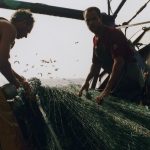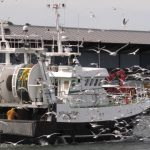Independent Adjudicator Melanie Carter has confirmed the original Determination of independent certifier Food Certification International Ltd. (FCI) that the Suriname Atlantic seabob shrimp fishery meets the MSC standard on all three Principles and should therefore be certified as sustainable.
In her conclusion, Melanie Carter stated: “In confirming this Determination, I would wish to reflect the evident professionalism of the assessment team and certification body, the commitment of the client fishery to the MSC Standard and the objector’s wish to ensure that the necessary rigour in that standard is maintained.”
The objection
The Independent Adjudicator’s decision follows a two year scientific assessment of the fishery by FCI and a four month review of an objection, lodged by the World Wide Fund Smart Fishing Initiative (hereafter: WWF), to the certifier’s finding that the fishery meets the MSC standard.
The objection process was initiated on 11 July 2011 and included written submissions as well as an oral hearing, held in early October. Following the adjudicator’s decision, the certifier will now submit the Final Certification Report to MSC concluding that the fishery should be awarded the MSC certificate.
The option for stakeholders to object is part of the standard process for every fishery that enters full assessment for MSC certification. It provides for an additional independent, structured review of a certifier’s decision.
Findings of the Independent Adjudicator
In her findings on the Suriname Atlantic seabob shrimp fishery, the Independent Adjudicator addressed the objectors’ concern that the assessment had been based on a flawed stock definition and that the Suriname seabob stock could not be treated separately from the neighboring Guyana stock. After careful consideration of all relevant submissions of the parties involved and the oral hearing, Ms Carter concluded that the certifier’s science-based working hypothesis of a distinct Surinamese stock had been a reasonable basis for the assessment. In the future, this stock hypothesis is to be kept under review as part of the annual audits.
A further ground for the objection was an apparent conflict of interest because two of the FCI assessment team members were believed to work, on occasion, for a consultancy which had assisted the fishery in the preparations for MSC assessment. The Independent Adjudicator decided that this was not the case.
Finally, the Independent Adjudicator also addressed objections that scores given by the certifier for several performance indicators could not be justified adequately. Taking into account all the evidence presented, Ms Carter decided not to remand any of the scorings for reconsideration by the certifier, concluding that the certifier’s scores formed a reasonable basis for the Determination.
Next steps
Based on the conclusions of the Independent Adjudicator, once final MSC procedural steps are concluded and FCI issues a certificate, the fishery will be certified in accordance with the certifier’s Final Report and Determination.
About the fishery
The fishery for the Atlantic seabob shrimp (Xiphopenaeus kroyeri), a small-sized short-lived shrimp, takes place in the coastal waters of Suriname and is located within the Guyana-Brazil Large Marine Ecosystem. Using twin-rigged otter trawls, the fishery runs all year round and is carried out by two companies, Heiploeg Suriname and Namoona/SAIL, under 20 licenses. The annual landings are approximately 10,000 metric tonnes, which is over 90% of the Suriname seabob landings.
The Suriname Atlantic seabob shrimp fishery entered full MSC assessment in June 2009 and is now the first fishery in Suriname to be managed under a formal national management plan.








